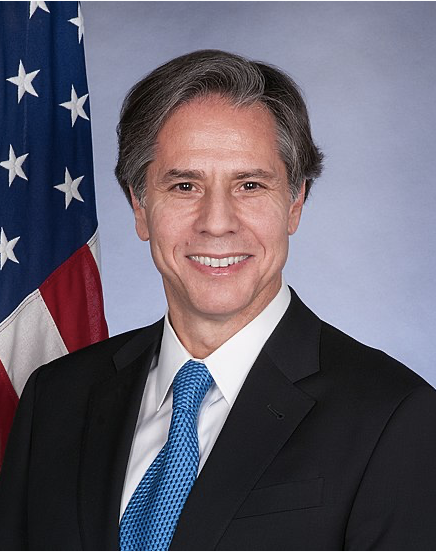
Antony Blinken has been chosen by President-elect Joe Biden as his nominee for the position of Secretary of State.
The position: Leads foreign policy, diplomacy for the president around the world.
Antony John Blinken was born in 1962, in New York City, New York, to Jewish parents, Judith (Frehm) and Donald M. Blinken, the former United States Ambassador to Hungary.
His maternal grandparents were Hungarian Jews. Blinken’s uncle, Alan Blinken, served as the American ambassador to Belgium.Blinken attended the Dalton School in New York City until 1971.
He then moved to Paris with his mother Judith and attorney Samuel Pisar, a Holocaust survivor whom she married following her divorce from Donald.
In Paris, he attended École Jeannine Manuel.Blinken attended Harvard University, where he majored in social studies and co-edited the weekly art magazine of The Harvard Crimson.
After earning his bachelor’s degree, Blinken reported for The New Republic.
In his monograph Ally versus Ally: America, Europe, and the Siberian Pipeline Crisis (1987), Blinken argued that exerting diplomatic pressure on the Soviet Union during the Siberian pipeline crisis was less significant for American interests than maintaining strong relations between the United States and Europe. Ally versus Ally was based on Blinken’s undergraduate thesis.He earned his J.D. at Columbia Law School in 1988.
After graduation, he practiced law in New York City and Paris.
Blinken was a member of the National Security Council (NSC) staff from 1994 to 2001.
From 1994 to 1998, Blinken was Special Assistant to the President and Senior Director for Strategic Planning and NSC Senior Director for Speechwriting.
From 1999 to 2001, he was Special Assistant to the President and Senior Director for European and Canadian Affairs.
He was also a senior fellow at the Center for Strategic and International Studies (2001–2002).In 2002, Blinken was appointed staff director for the Senate Foreign Relations Committee, a position he served in until 2008. He assisted then-Senator Joe Biden, Chair of the Senate Foreign Relations Committee, in formulating Biden’s support for the U.S. invasion of Iraq, with Blinken characterizing the vote to invade Iraq as “a vote for tough diplomacy”.
In the years following the U.S. invasion and occupation of Iraq, Blinken assisted Biden in formulating a proposal in the Senate to establish in Iraq three independent regions divided along ethnic or sectarian lines. The proposal was overwhelmingly rejected at home, as well as in Iraq where the prime minister opposed the partition plan.
From 2009 to 2013, Blinken served as Deputy Assistant to the President and National Security Advisor to the Vice President. In this position, he helped craft U.S. policy on Afghanistan, Pakistan, and the nuclear program of Iran.
Blinken supported the 2011 military intervention in Libya and the supply of weapons to Syrian rebels. A 2013 profile described Blinken as “[o]ne of the government’s key players in drafting Syria policy”, for which he served as a public face.
He served as Deputy National Security Advisor from 2013 to 2015 and Deputy Secretary of State from 2015 to 2017.
Blinken was influential in formulating the Obama administration’s response to the annexation of Crimea by the Russian Federation in the aftermath of the 2014 Ukrainian revolution.
In April 2015, Blinken voiced support for the Saudi Arabian-led intervention in Yemen. He said that “As part of that effort, we have expedited weapons deliveries, we have increased our intelligence sharing, and we have established a joint coordination planning cell in the Saudi operation centre.”
He condemned the 2016 Turkish coup d’état attempt and expressed support for the democratically elected Turkish government and its institutions, but also criticized the 2016–present purges in Turkey.
In 2017, Blinken co-founded WestExec Advisors, a political strategy advising firm, with Michèle Flournoy, Sergio Aguirre, and Nitin Chadda. WestExec’s clients have included Google’s Jigsaw, Israeli artificial-intelligence company Windward, surveillance drone manufacturer Shield AI, which signed a $7.2 million contract with the Air Force and “Fortune 100 types”. According to Foreign Policy, the firm’s clientele includes “the defense industry, private equity firms, and hedge funds.”
Blinken, as well as other Biden transition team members Michele Flournoy, former Pentagon advisor, and Lloyd Austin, nominee for Secretary of Defense, was a partner of private equity firm Pine Island Capital Partners, a strategic partner of WestExec. Pine Island’s chairman is John Thain, the final chairman of Merrill Lynch before its sale to Bank of America.
In September 2020, Pine Island raised $218 million in a public offering to invest in “defense, government service, and aerospace industries”, as well as COVID relief, which the firm’s prospectus predicted would be profitable as the government looked to private contractors to address the pandemic. Thain said he chose the other partners because of their “access, network and expertise.”
In a December 2020 New York Times article raising questions about potential conflicts of interest between WestExec principals, Pine Island advisors, including Blinken, and service in the Biden administration, critics called for full disclosure of all WestExec/Pine Island financial relationships, divestiture of ownership stakes in companies bidding on government contracts or enjoying existing contracts, and assurances that Blinken and others recuse themselves from decisions that might advantage their previous clients.
Blinken recused himself from Pine Island Capital Partners in 2020 to serve as a senior foreign policy advisor with the Biden campaign.
Blinken is a member of the Council on Foreign Relations and as of 2020, Blinken was a global affairs analyst for CNN.